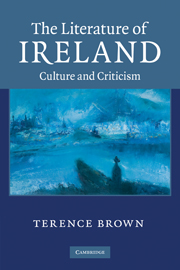Book contents
- Frontmatter
- Contents
- Acknowledgements
- Introduction
- 1 The Literary Revival: historical perspectives
- 2 Joyce's magic lantern
- 3 Music: the cultural issue
- 4 Modernism and revolution: rereading Yeats's ‘Easter 1916’
- 5 Shakespeare and the Irish self
- 6 Irish literature and the Great War
- 7 Ireland, Modernism and the 1930s
- 8 Post-modernists: Samuel Beckett and Flann O'Brien
- 9 Patrick Kavanagh: religious poet
- 10 MacNeice's Irelands: MacNeice's islands
- 11 Louis MacNeice and the Second World War
- 12 MacNeice and the puritan tradition
- 13 John Hewitt and memory: a reflection
- 14 Michael Longley and the Irish poetic tradition
- 15 Seamus Heaney: the witnessing eye and the speaking tongue
- 16 Derek Mahon: the poet and painting
- 17 Telling tales: Kennelly's Cromwell and Muldoon's ‘The More a Man Has the More a Man Wants’
- 18 Redeeming the time: John McGahern and John Banville
- 19 ‘Have we a context?’: transition, self and society in the theatre of Brian Friel
- 20 Hubert Butler and nationalism
- 21 The Irish Dylan Thomas: versions and influences
- Index
- References
10 - MacNeice's Irelands: MacNeice's islands
Published online by Cambridge University Press: 05 June 2012
- Frontmatter
- Contents
- Acknowledgements
- Introduction
- 1 The Literary Revival: historical perspectives
- 2 Joyce's magic lantern
- 3 Music: the cultural issue
- 4 Modernism and revolution: rereading Yeats's ‘Easter 1916’
- 5 Shakespeare and the Irish self
- 6 Irish literature and the Great War
- 7 Ireland, Modernism and the 1930s
- 8 Post-modernists: Samuel Beckett and Flann O'Brien
- 9 Patrick Kavanagh: religious poet
- 10 MacNeice's Irelands: MacNeice's islands
- 11 Louis MacNeice and the Second World War
- 12 MacNeice and the puritan tradition
- 13 John Hewitt and memory: a reflection
- 14 Michael Longley and the Irish poetic tradition
- 15 Seamus Heaney: the witnessing eye and the speaking tongue
- 16 Derek Mahon: the poet and painting
- 17 Telling tales: Kennelly's Cromwell and Muldoon's ‘The More a Man Has the More a Man Wants’
- 18 Redeeming the time: John McGahern and John Banville
- 19 ‘Have we a context?’: transition, self and society in the theatre of Brian Friel
- 20 Hubert Butler and nationalism
- 21 The Irish Dylan Thomas: versions and influences
- Index
- References
Summary
An island means isolation; the words are the same. We expect in an island to meet with insular vices. What is shocking is to find an island invaded by the vices of the mainland.
Louis MacNeice, I Crossed the MinchThe question of Louis MacNeice's Irishness can still generate controversy in Ireland. It may now be fairly widely accepted that MacNeice was one of the most accomplished of the post-Yeatsian generation of poets, but this Oxford-educated and London-domiciled, displaced Northern Irishman is still sometimes disallowed a role in the intellectual life of the Ireland of his day. As long ago as 1974 the poet Derek Mahon opined that he had played no role in the country's intellectual life and seemed unwilling, even as late as 1985 in an interview with myself as editor of the Poetry Ireland Review, to retract. And in 1987 Denis Donoghue, reviewing a volume of MacNeice's selected criticism in the London Review of Books (23 April), was able to use the original Mahon obiter dictum as a stick to beat those of us who think that the statement requires at the least substantial qualification if it cannot be completely contradicted.
There is, of course, lots of evidence to support the Donoghue line. In Armitage and Clark's less than fully dependable bibliography of MacNeice's work, we find that MacNeice in the course of a prolific poetic career published in only two Irish periodicals: in The Bell, when he was poetry editor, and once in Lagan, the Northern Irish annual associated with the Ulster regionalist movement of the 1940s.
- Type
- Chapter
- Information
- The Literature of IrelandCulture and Criticism, pp. 131 - 141Publisher: Cambridge University PressPrint publication year: 2010



